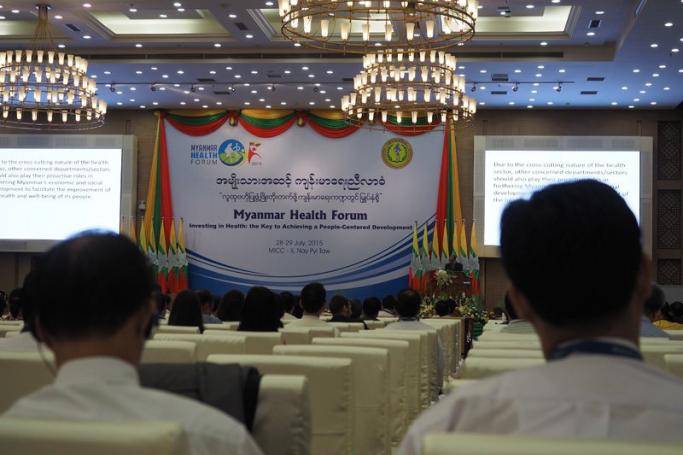Participants at the first Myanmar health forum agreed that although the government is on the right path in developing its health sector, more needs to be done to achieve universal health care by the year 2030. Members of the Government, health experts, international organisations, civil society organisations and the private sector attended the inaugural health forum in Nay Pyi Taw over the 28th and 29th of July to discuss the direction of the government's health policy.
Most were in agreement about the need for a multi-sectorial approach to achieving Universal Health Care; a system which sees all branches of government involved and collaborating with external stakeholders to respond to the needs of the people rather than duplicating efforts due to a lack of co-ordination and transparency between the groups.
In his opening address, Vice President of Myanmar Dr. Sai Mauk Kham, emphasised the government's commitment to achieving its millennium development goals and highlighted an increase in spending on health, up 8.7 times from 2011-2012, to 602 million dollars in the 2015-2016 fiscal year. Myanmar's economy is predicted to grow by 9.3% this fiscal year which sees growth in the health sector a reflection of fiscal growth rather than specific initiatives undertaken by the government. Myanmar still only contributes only 1.8% of GDP to its health sector, compared to military expenditure at 4.3% GDP.
Dr Andrew Cassels, a panellist at the forum, former WHO adviser and founding director of GH Associates, says more funding is needed for Myanmar to achieve it's Millennium Development Goals.
“On the spending side, the economy is growing and so there will be some growth anyway. I think where the government has to show more political will is actually increasing the proportion of government spending that goes to health and increasing the proportion of GDP. It’s lower than anywhere else in the region at the minute.”
A panel discussion emphasised the need of a bottom up approach to development in order to deliver vital health resources to people who live outside major urban centres. In Myanmar 70% of the population lives in rural areas. Often these areas are lacking in basic health services, with those in the more remote, ethnic regions likely to miss out.
“Myanmar's starting from a low base. It's put a lot of attention into hospitals whereas what is really needed is attention to lower levels of the system, the district hospitals and the clinics and so on. So there is a need for a bit of a change in direction.” said Dr Andrew Kassel.
Deputy Minister of Health, Dr Thein Thein Htay, echoed this sentiment saying there are inequalities developing in Myanmar's health system and only a “people centred” approach to development will succeed. He emphasised the need for “transparency and good government” to reform the health sector but “one (the government's) hand must be on the steering wheel to steer this development.”
A large part of the discussions was the disproportionate and increasing burden of Non-communicable diseases (NCD's) in low-middle income countries. Myanmar is classified in this group. Economic growth, urbanisation and subsequent lifestyle changes contribute to NCD's, which cause 60% of all mortalities in Myanmar.
“Some of the big problems in Myanmar are things like diabetes, heart disease, and all the non-communicable diseases which are affecting countries all over the world
... in a country where you have got big investments coming in in all kind of sectors, some of them can be really helpful and some of them are not going to be so helpful; fast food, alcohol, cigarettes...that requires action from the government, not just the ministry of health but at a higher level, from the president downwards to get other ministries involved.” Said Dr Cassels.
Transparency and oversight in the health sector between the government and internal and external stakeholders was seen as the cornerstone for successful multi-sectorial development. Recently, extreme nationalist Buddhist group Ma Tha Ba expelled an aid agency involved in flood relief efforts in the Sagaing region claiming they did not co-ordinate aid efforts with the group. Incidents like this illustrate the difficulties Myanmar faces within the sector.
“The encouraging thing about this meeting is that people both in the international community and national community are raising very difficult issues in public and sharing those problems, whereas before the problems have been reserved for government and there had been very little discussion." Said Dr Andrew Cassels speaking on the forum.
“That alone, opening up a quite adult discussion about some of the problems the country is facing, is a really positive sign.” He said.
Transparent multi-sectorial development needed in Myanmar’s health sector
01 August 2015
Transparent multi-sectorial development needed in Myanmar’s health sector












